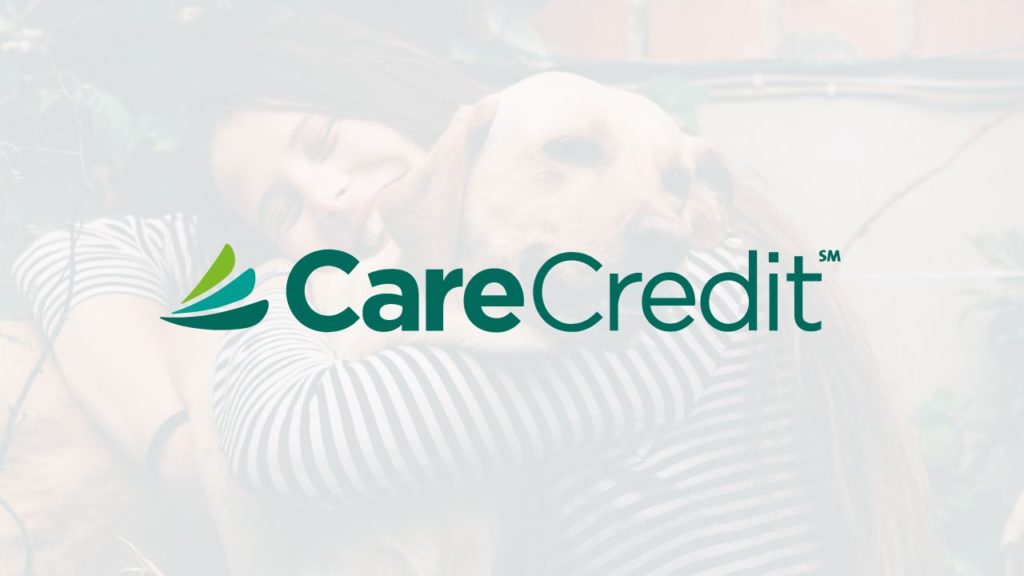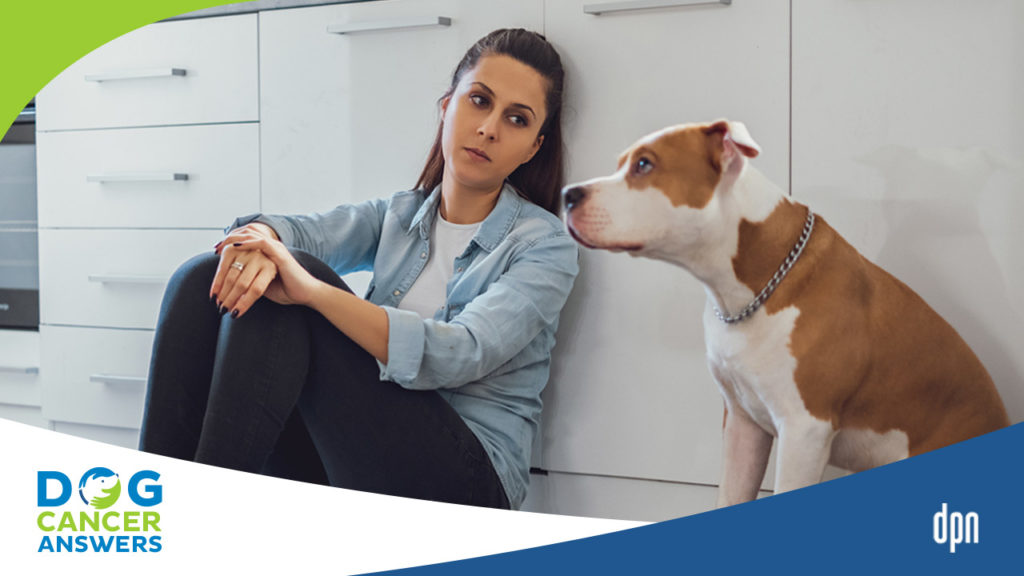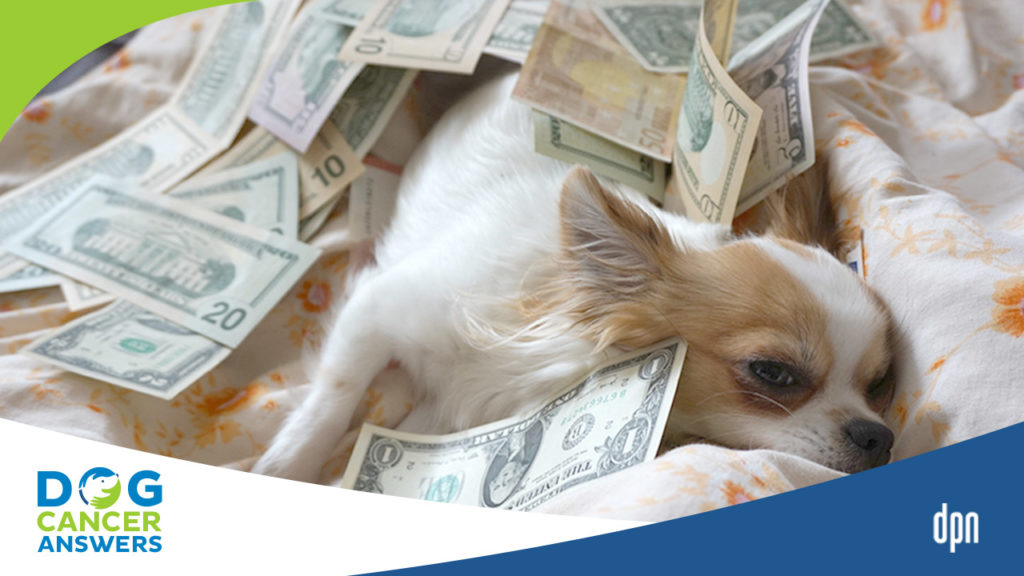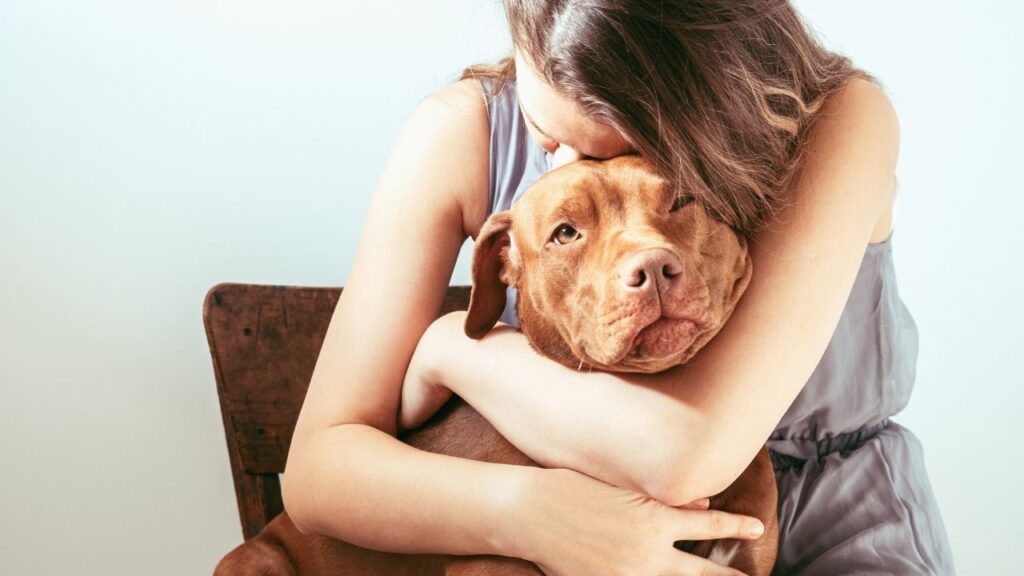After the initial shock of a cancer diagnosis, the next concern is almost always the cost of dog cancer treatments. How can anyone expect you to figure out how to pay for your dog’s cancer treatments when your heart is broken? First, take a deep breath. You are not alone. The high cost of cancer treatment for dogs may be daunting, but there are options out there.
Key Takeaways
- The cost of chemotherapy makes many of us wonder if giving a dog chemo is worth it. There are no guarantees about specific outcomes, only statistics, so the answer will be different for everyone. But it’s good to keep in mind that chemo is generally really well tolerated by dogs.
- If your dog has cancer and you can’t afford treatments, there are more options than ever to find funding, including charities, online fundraising, and medical credit options.
- How long your dog will live after being diagnosed with cancer depends widely on the stage and type of cancer, and the treatments used. While every treatment costs some amount of money, your veterinarian will be a big help in deciding how to spend limited funds so you get as long as possible with good life quality.
- How much chemotherapy and other treatments like surgery and radiation cost will vary. There are also many other costs associated with cancer treatments, like tests and imaging. Your veterinarian and/or oncologist will be able to provide you with a cost estimate for every option they offer you.
- Asking your veterinarian “how much time do you think this option will buy me?” is a good idea, no matter what course of treatment you are considering.
Insider Tip: Let go of your guilt!
Most people have not planned for the cost of cancer treatment for dogs. In the last two years, 28% of people have had some kind of problem accessing veterinary care, usually financial. Twenty-nine million dogs and cats live in households that utilize government feeding assistance programs and 75% of Americans who are working full-time still live paycheck to paycheck. 1 If you are having financial difficulties, you are in good company. Move forward the best you can and remember, your dog wants your love, not your money!
Why Is Dog Cancer Treatment So Expensive?
A veterinary clinic is a business, just like any other, so it is going to cost money. Nobody likes to talk about money, but it’s important, so let’s break it down.
Let’s answer the first question: What am I paying for?
We want to help you understand where all your hard-earned cash goes. The following factors vary from clinic to clinic.
Veterinarian Factors
Without veterinarians, we don’t have a veterinary hospital. Here’s what you are paying for when it comes to veterinarians.
- The veterinarian’s time. This includes the hours spent in appointments, but also performing surgeries, performing procedures, evaluating lab results, making phone calls, writing emails, and calculating and refilling prescriptions in and out of the clinic.
- The veterinarian’s education. The average veterinarian has at least a Bachelor’s (four-year) degree, plus a veterinary medicine degree, which takes four more years. Specialists (including oncologists) also had an internship and/or a residency and passed a board certification examination. Every veterinarian must attend regular continuing education and must maintain certifications such as an active state veterinary license, a DEA license, and liability insurance.
- The veterinarian’s wages. Veterinarians need to make a living wage. We have homes, bills, families, and veterinary bills, too!
Did you know? In general, veterinarians pay about the same for their education as human physicians do but make one half or even one quarter of the income.
Support Staff Factors
The support staff are all of the people working in the clinic who help the veterinarian. These include veterinary technicians, veterinary assistants, front desk staff, and kennel staff. Here are some of the costs associated with support staff.
- The support staff’s time. This includes the hours spent in appointments, treating patients, assisting in surgery and with anesthesia, communicating with clients, and maintaining the building, supplies, drugs, and equipment.
- The support staff’s education. This varies, but certified veterinary technicians receive an intensive and formal education. They also maintain continuing education requirements and certifications.
- The support staff wages. Our support staff need to make a living wage (and they often don’t!). These wonderful people have homes, bills, families, and veterinary bills, too.
Building Factors
This varies widely by area and type of facility, but includes mortgage or rent, insurance, utilities, repairs, maintenance, and other overhead costs.
Business Costs
This varies widely by area and type of clinic, but includes advertising, insurance, technology, business licenses, and other costs.
Medication Costs
This includes medications for in-house use as well as stocking the pharmacy for patients to take home. Many medications used in veterinary medicine are the same used in human medicine. Vaccines and controlled substances must be stored and documented properly. This requires a lot of time and attention.
Equipment and Supplies Costs
Equipment costs vary widely from clinic to clinic, but include the x-ray machine, dental machine, blood or urine analyzers, laser machines, ultrasound machine, and more. Many of these larger investments are financed, which means monthly loan payments must be made. They also require periodic supplies to be reordered.
Regular supplies also include surgical supplies such as gowns, gloves, blades, and suture, general medical supplies such as bandages and syringes, and general instruments such as otoscopes and thermometers. Many supplies used in veterinary medicine are used in human medicine and cost the same amount.
Narrow Overheads
As you can see, there is A LOT to pay for! It can feel like too much, especially compared to human medicine. But veterinary medicine is not the “money maker” you might assume by looking at the bill.
After all, most human medical bills are sent to insurance companies for payment, and we only see what’s left over after they pay their part. Most people pay veterinary bills out of pocket, so you see the whole bill right up front.
We hope it helps to know where your money is going.
Insider Tip: Most veterinary clinics can’t offer payment plans. You can ask if you want, but don’t be surprised when they say, “No.” Why not? There are several reasons for this. Most clinics do not have a billing department like human medical offices do. They do not have time for veterinarians or support staff to send invoices, chase down payments, and send people to collections. They need to spend their time caring for animals, not billing! In many veterinary clinics, cash flow is too slow, and the clinic needs the money to continue to care for animals. And sadly, many people never pay their bills, and a veterinary clinic cannot stay open if they extend credit.
What Is the Average Cost of Cancer Treatment for Dogs?
Cancer treatment costs vary widely by type of cancer, type of treatments, where you live, if you go to a specialty veterinarian or general practice, and whether a veterinary school is involved.
Costs to consider:
- Exam by general practice veterinarian and/or specialist (such as oncologist, surgeon, et cetera)
- Diagnostics and staging: blood work, urinalysis, X-rays, MRI, CT, pathologist fees
- Other medications: steroids, anti-inflammatories, supportive care
- Cancer-specific treatments: chemotherapy, radiation, immunotherapy
- Surgical costs
- Other costs: hospitalization, alternative treatments, follow-up visits and treatments, euthanasia
There are too many variables to accurately guess the total cost of cancer treatment. However, we’ll give it a try:
- The minimum for an initial veterinary visit, basic diagnostics, and supportive or palliative care is likely $200-$500.
- For the maximum gold-star, aggressive cancer treatment, you may spend $20,000 (up to $50,000 in some cases).
- The range is everything in between those two numbers!
A good question to ask your veterinarian is this: how much good quality time with my dog do you think this will buy me? They will not be able to answer your question with a specific number of days, weeks, or months, but they should have an idea in their heads of what you can hope for.
Cost Estimates
Your veterinarian will likely give you a cost estimate for your visit (or a course of treatment). Cost estimates are an educated guess of what the veterinary visit will cost.
An estimate will include the cost of examinations, medications, procedures, surgeries, treatments, and hospitalizations. It is usually itemized, so be sure to ask for an explanation if you don’t understand what something is or what it is for.
It is perfectly fine to understand what you are paying for, but it is not okay to haggle over prices. (You wouldn’t do that to Walmart, so why would you do that to your vet?)
Remember, veterinarians can’t see the future – things can change and unexpected things happen. Costs may go up or down depending upon how your dog’s cancer responds. Veterinarians should be able to speak to you when things come up. Most veterinary offices can update estimates daily or when something unexpected happens.
Insider Tip: Actually read the estimate before you sign. Ask questions, keep calm, and be nice.
What If the Bill Goes Over?
Your best option is to try and prevent that. Keep a close eye on your bill and ask for a daily update. Know what you already signed. Most of all, communicate with the veterinarian and technicians that finances are an issue, and request that someone give you a call before something new or unexpected is added to the bill. And answer your phone when they call!
Insider Tip: Communicate your financial issues to the veterinarian. Most veterinarians can offer different options for diagnostics, treatments, or medications to accommodate any budget while still helping your dog. Veterinarians are not psychic, so they do not know you are having financial issues if you don’t tell them. We are trained to offer the best we can, but almost always have alternatives in mind. Also, don’t be embarrassed, you are not the only one with financial concerns.
Veterinary oncologist Megan Duffy explains the financial side of cancer treatments on this episode of DOG CANCER ANSWERS.
Is an Oncologist Worth It?
In general, we recommend at least consulting or having an initial examination with an oncologist:
- If you want to know all the options and what it might cost
- If you think you might want to treat the cancer
- If you want a second opinion
- If you want a prognosis (estimate of likely outcome)
- If you are just not sure and don’t want to miss anything
Many people are hesitant to see the oncologist, but remember, a consultation with an oncologist does not commit you to any diagnostics or treatment.
You may feel pressure to do everything the oncologist recommends, but they do not expect you to just say yes to everything they offer. You can decline the options they offer. If money is an issue, open the lines of communication and see what else they can offer.
Oncologists know the cost of dog cancer treatment keeps many people from even making an appointment. They are aware of this as a concern, and you will not be the first pet parents to have it.
Why Take My Dog to the Oncologist?
It might seem like an extra expense but visiting an oncologist might save you money. That’s because:
- They have more education. In addition to undergraduate and veterinary school, most oncologists had an internship and a residency, or three to five years of additional focused training on oncology. Plus, they must pass a very challenging board exam.
- They have more experience. Oncologists only treat cancer all day, while your general practice veterinarian has to treat everything that comes in the door.
- They have more resources. Most oncologists can offer advanced diagnostics (such as CT, MRI, ultrasound, and other specific tests), have access to other veterinary specialists (neurologist, internists, surgeons, and others), have ready access to cancer-specific medications (such as chemotherapy drugs and immunotherapies) and have access to radiation machines.
- They have more connections. Oncologists know what current trials are available and have access to the newest treatment options.
If your oncologist knows money is an issue, they might skip diagnostic tests so you have more to spend on treatments. Many oncologists are also happy to work with your regular veterinarian to help cut costs. Often you can get routine blood work, x-rays, medications, and supportive treatments at your regular veterinarian and they can send the results to the oncologist. Just ask if this is an option for you and your dog.
What if There Is No Oncologist in My Area?
If you do not have access to an oncologist, there is still a lot you can do, but it will require working very closely and communicating clearly with your regular veterinarian. Ask your regular veterinarian what he or she has done before and what he or she is comfortable doing.
- Is there an oncologist a few hours away that you can see less frequently, and then have your regular vet handle follow-up?
- Is your regular vet willing and able to consult with the local oncologist by phone or telemedicine?
- Can/will she do this surgery?
- Can/will she get this chemotherapy drug?
Together, you can decide if you are looking for supportive or palliative care, full aggressive cancer treatment, or something in between (for example, surgery but not chemotherapy). In general, veterinarians are kind, helpful, and creative people; as a team you should be able to figure out something that works for everyone.
Should I Get a Second Opinion?
Every doctor, regular veterinarian or veterinary oncologist, has her own experience, education, and opinion on how to treat disease.
It can be very helpful to get another doctor to weigh in on your dog’s case with a second opinion, especially if something the first doctor recommended doesn’t sit well with you.
However, don’t spend too much time and mental energy looking for an answer you want to hear. With cancer, you don’t have time to spare.
Also, beware of shopping around for the cheapest option; you usually get what you pay for.
When Is My Regular Veterinarian Better Than an Oncologist?
Oncologists are an amazing resource, but there are times they are just not necessary. In general, your regular veterinarian can handle things when:
- You are certain you do not want to aggressively treat your dog’s cancer with chemotherapy, advanced surgery, or radiation. If your goal is supportive care, keeping your dog comfortable, and maintaining a good quality of life until the time for euthanasia, your regular veterinarian is the expert.
- You do not have access to an oncologist.
- You need to keep costs down (which usually means supportive care options instead of specific cancer treatment).
Insider Tip: Balance emotion and practicality. It can be helpful to decide to have “two brains”: parent and doctor, heart and head. Then, use both those brains to find a balance. Cancer is a heartbreaker, and it’s complicated.
When your head is feeling overwhelmed with the information, ask questions, and do your own research on dogcancer.com.
When your heart is feeling overwhelmed with emotion, ask yourself, “What would my dog want?” Remember, your dog doesn’t know he has cancer, he just wants your love. So, give it to him!
Having two brains to “think about” dog cancer can really help you find a balance between treating and life quality.
Dr. Lauren Barrow has a compassionate strategy for talking with her clients about finances. Not just because of her veterinary experience, but because of her experience as a mother of a child with brain cancer. A special episode of DOG CANCER ANSWERS.
Financial Assistance for Dog Cancer Treatments
If you do not have the funds in hand to pay for cancer treatments, but would still like to move forward, there are some resources available. We will list a few options here, but if you are creative, we’re sure you can come up with more. Click the links for more information.
- Online fundraising. There are many organizations already in place for this purpose. Check out GoFundMe, Plumfund, PetChance, PetFundr, GiveForward, YouCaring, and Waggle.1 These methods are often effective, and can be relatively easy depending on your social network. That said, these methods can also be obnoxious, and can turn off friends and acquaintances, so be careful where you share. Make sure you only post these fundraisers on appropriate sites.
- IRL (in real life) fundraising. Think a bake sale, yard sale, book sale, carwash, or some kind of event at a local business.1 Fundraisers can be effective depending on your outreach. It can help to feel like you’re doing something, and people can meet your dog (who is charming enough to raise more money!). However, fundraisers often take a lot of work and planning. You will need a lot of publicity, a location, supplies, and many other things. But if you are a good party or event planner, this may be a great way to raise cash.
- Charities. Recognizing the inherent difficulties of paying for dog cancer treatments, some wonderful new charities have popped up in the last few years. Check out the Animal Cancer Foundation website for a current list.2 Also, ask your veterinarian if they know any local charities, and do a quick search for your area. These charities can be surprisingly helpful in the right situation, but it can be difficult to get through the applications. Applications usually take time, there is usually competition, and often specific requirements such as household income information, type of cancer diagnosis, prognosis, state of residence, and many other factors to consider.
- Credit Cards. Look into using the standard credit cards you already have, or perhaps get a new low APR card. CareCredit, which is a low APR card just for medical expenses, is often a good choice. Credit cards can cover most, if not all, of the medical payments quickly and easily, but if you have bad credit, no credit, or high interest rates, this option may not work for you.
- Pet insurance or savings account. This is the best long-term option for paying for cancer treatments, in our opinion. Pet insurance and/or savings accounts can often cover a lot of costs, and you can use them with other options here. These both require less work on your part and don’t hit your credit score. For this option to work, you have to have saved money or signed up for insurance ahead of time. It usually won’t work to get your dog health insurance at the time of cancer diagnosis because insurance companies will not cover pre-existing conditions. (So, if you are reading this and your dog does not have cancer, go get her insurance right now. Or open a savings account.)
What if I Can’t Pay My Vet Bill?
If you just cannot get the funds, or you elect not to treat for other reasons, there is still a lot you can do for your dog. Remember, your dog wants your love, not your money!
If you are unable to pay the cost of cancer treatment and you are unable to provide supportive care or palliative care, there are two more options that no one likes to talk about:
1. Relinquishment. This is when you legally sign over ownership of your dog to another person, a veterinary clinic, a shelter, or a rescue.
Pros: Your dog’s cancer will be treated, to some extent, and it won’t cost you.
Cons: You will have no say in your dog’s treatment, and you won’t get to take her home. There are many legal, moral, and emotional pitfalls to this option, for both you and the adopting entity.
2. Euthanasia: A humane, peaceful, non-painful, non-frightening death can be considered.
Pros: If your dog is very sick, is suffering, the cancer is not treatable, or the prognosis is very bad, euthanasia will offer some peace.
Cons: It is heartbreaking. No one, especially you or the veterinarian, likes to euthanize for financial reasons. Everyone we know will try every other option before resorting to euthanasia, but please bring it up if you feel it is an option to consider.
Last Insider Tip: We’ve said it three times now, your dog wants your love, not your money. A cancer diagnosis is difficult for everyone involved, and financial concerns only make it worse. Use the above info to help you figure out the practical part of paying for cancer treatments and/or supportive care, but remember, your dog does not know she has cancer. She may know her leg hurts or she’s having trouble breathing, but she doesn’t have that fear that a human would have of a cancer diagnosis. Let that be a comfort to you. Each moment you have with your dog is a gift, no matter what treatments she gets. Don’t waste it worrying about the cost of dog cancer treatment.
Dr. Demian Dressler mounts a vigorous defense of those of us who can't or won't treat dog cancer, for whatever reason. His compassion is hard-won. A must-listen episode of DOG CANCER ANSWERS.
- Program for pet health equity (2018) Program for Pet Health Equity. Access to veterinary care coalition. Available at: https://pphe.utk.edu/ (Accessed: November 28, 2022).
- Financial assistance: Animal cancer foundation (no date) Animal Cancer Foundation | Uniting Pet and Human Research for a Cure. Available at: https://acfoundation.org/financial-assistance/ (Accessed: November 28, 2022).
See Also:
Animal Cancer Foundation acfoundation.org
The National Canine Cancer Foundation wearethecure.org
How to Get Emergency Help With Vet Bills: Free Resources gofundme.com
Topics
Did You Find This Helpful? Share It with Your Pack!
Use the buttons to share what you learned on social media, download a PDF, print this out, or email it to your veterinarian.










